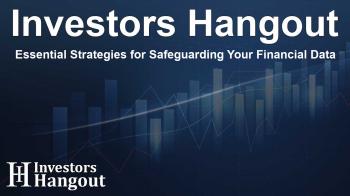Essential Strategies for Safeguarding Your Financial Data

Protecting Your Financial Data: Key Strategies
As we navigate the digital landscape, ensuring the safety of our financial data has become more crucial than ever, especially during Cybersecurity Awareness Month. It’s essential to understand that cybersecurity is not just the job of financial institutions, but a shared responsibility between them and the consumers. Recognizing this, many organizations are stepping up their efforts to educate their customers about effective ways to protect their information.
The Role of Community Banks in Cybersecurity
Community banks play a significant role in safeguarding their customers' information. They utilize advanced technology and stringent security protocols to keep data safe. For instance, strong firewalls, encryption methods, and continuous monitoring help these institutions thwart potential threats before they can cause harm. First Federal Savings Bank, known for its commitment to security, emphasizes educating its customers about best practices to mitigate risks.
Empowering Customers with Knowledge
According to industry experts, a staggering percentage of cybersecurity breaches stem from human error. Organizations are increasingly reminded that educating customers about safe online practices is vital. Implementing secure data practices while understanding one's role in cybersecurity can significantly lower risks associated with data breaches.
Steps to Minimize Personal Financial Risks
While no system is entirely foolproof against cyberattacks, there are several proactive measures you can take to reduce your risk. Here are vital recommendations:
- Limit Information Disclosure: Be cautious about sharing personal details, especially if the request is unsolicited. Always verify the source before divulging any sensitive information.
- Create Unique Passwords: Establish strong, distinct passwords for each account, and consider using a password manager to streamline this process. Regularly updating passwords can also enhance your security.
- Make Use of Security Features: Use multifactor authentication wherever possible; this adds an essential layer of security to your accounts.
- Be Wary of Phishing Scams: Stay alert regarding emails or texts that request personal information. Always verify sender details before clicking on links or engaging with the message.
- Keep Software Up-to-Date: Regular updates for your device’s apps and antivirus software are crucial in protecting against emerging threats.
- Monitor Your Accounts: Regularly check your financial statements for any unauthorized transactions. Quick reporting of suspicious activity can help mitigate potential damages.
Understanding the Importance of Cybersecurity Awareness
As threats evolve, it’s increasingly important for consumers to be proactive in securing their financial assets. Organizations like First Federal Savings Bank not only implement robust security measures but also strive to engage their customer base in discussions about cybersecurity. Small adjustments in our digital behavior can lead to significant reductions in risk.
Community Banks and Their Contributions
Community banks are key players in nurturing local economies and supporting financial growth. By prioritizing security and providing their customers with necessary resources, these banks contribute greatly to the overall safety of financial transactions in their communities.
Conclusion
In conclusion, safeguarding your financial data is a critical component of financial health in today’s digital age. By adhering to the recommended practices and staying informed about the latest security threats, consumers can better protect themselves against cyber risks. Working together with financial institutions can enhance our collective security and promote a safer online experience.
Frequently Asked Questions
What are the major cybersecurity threats today?
Key threats include phishing scams, ransomware, and data breaches, which commonly cause financial loss.
How can I create a strong password?
A strong password typically combines upper and lower case letters, numbers, and symbols, and should not be related to personal information.
Why is multifactor authentication important?
Multifactor authentication adds an extra layer of security by requiring verification from more than one source, making unauthorized access more difficult.
What should I do if I suspect fraudulent activity?
Immediately contact your bank to report any suspicious activity on your accounts and follow any guidance they provide.
How often should I update my passwords?
It’s advisable to update passwords regularly, at least every 3-6 months, and immediately after any suspected breach.
About The Author
Contact Kelly Martin privately here. Or send an email with ATTN: Kelly Martin as the subject to contact@investorshangout.com.
About Investors Hangout
Investors Hangout is a leading online stock forum for financial discussion and learning, offering a wide range of free tools and resources. It draws in traders of all levels, who exchange market knowledge, investigate trading tactics, and keep an eye on industry developments in real time. Featuring financial articles, stock message boards, quotes, charts, company profiles, and live news updates. Through cooperative learning and a wealth of informational resources, it helps users from novices creating their first portfolios to experts honing their techniques. Join Investors Hangout today: https://investorshangout.com/
The content of this article is based on factual, publicly available information and does not represent legal, financial, or investment advice. Investors Hangout does not offer financial advice, and the author is not a licensed financial advisor. Consult a qualified advisor before making any financial or investment decisions based on this article. This article should not be considered advice to purchase, sell, or hold any securities or other investments. If any of the material provided here is inaccurate, please contact us for corrections.

